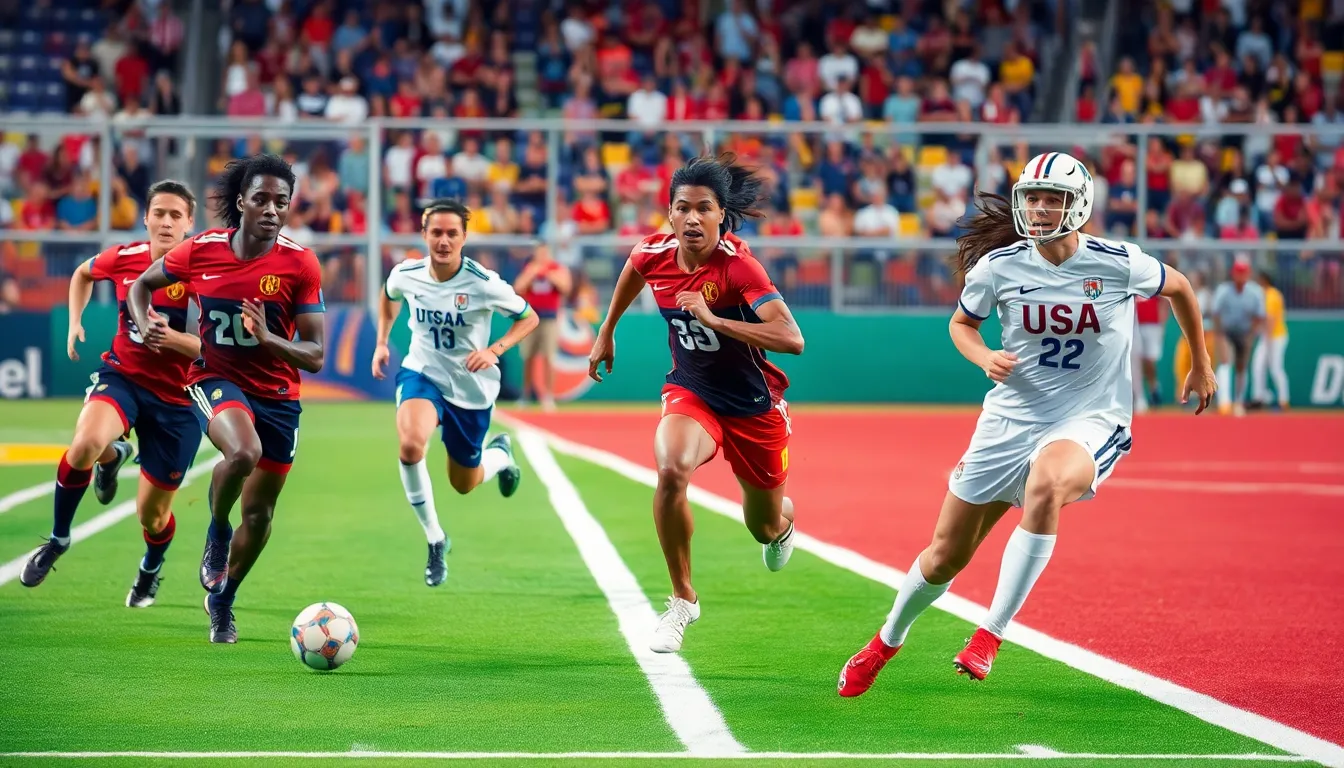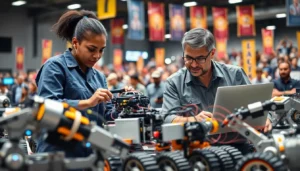Table of Contents
ToggleImagine a world where metal meets muscle, and circuits compete with sweat. Is robotics a sport? This question might sound like a punchline waiting for a laugh, but it’s a serious debate that’s gaining traction. As teams of engineers and tech enthusiasts gather to design and battle their robotic creations, the lines between traditional sports and these high-tech showdowns start to blur.
Picture this: robots spinning, flipping, and dodging like athletes on a field. They might not break a sweat, but the tension is real, and the competition is fierce. So, do these mechanical marvels deserve a spot in the sports arena? Buckle up as we dive into the thrilling world of robotics and explore whether it deserves the title of “sport” or if it’s just a clever ploy to get more folks interested in STEM.
Understanding Robotics
Robotics encompasses the design, construction, and operation of automated machines. These machines often perform tasks traditionally done by humans, highlighting their versatility across various sectors.
Definition of Robotics
Robotics refers to the branch of technology focusing on robots. These programmable machines execute specific tasks autonomously or semi-autonomously. Key components include sensors, actuators, and control systems, allowing robots to interact with their environment. Institutions like the IEEE define robotics as a nuanced field intertwining mechanical engineering, computer science, and electronics. The increasing sophistication of robotics elevates its relevance in industries like manufacturing, healthcare, and entertainment.
Types of Robotics
Types of robotics categorize machines based on functionality and application. Industrial robots typically handle manufacturing tasks, such as assembly and welding. Service robots assist humans in daily activities, appearing in homes and hospitals. Medical robots perform surgeries with precision, significantly enhancing patient care. Educational robots engage students in learning experiences, promoting STEM interest through hands-on activities. Each type contributes uniquely to its field, demonstrating the expansive nature of robotics.
The Concept of Sport


Defining sport involves understanding various characteristics that set it apart. Traditional sports engage participants in physical competition, showcasing skill, speed, and strategy.
Characteristics of a Sport
Sport features clear rules and objectives, facilitating fair competition. Active participation is crucial, whether through individual efforts or teamwork. Physical exertion often plays a significant role, demanding stamina, agility, and strength. Competitiveness drives participants to aim for victory while gaining spectator interest. Lastly, an element of entertainment captivates audiences, enhancing the experience for both players and viewers.
Examples of Traditional Sports
Examples of traditional sports include football, basketball, and soccer, which involve teamwork and strategy. These activities command global fan bases and foster community spirit. Additionally, track and field events showcase individual talents, emphasizing speed and endurance. Participation varies widely, with team sports promoting collaboration and individual sports offering personal challenges. Through competitions, athletes demonstrate their skills and commitment, solidifying the essence of sport in societies worldwide.
Robotics Competitions
Robotics competitions showcase the creativity and technical prowess of teams while highlighting the competitive spirit evident in traditional sports. These events attract participants from diverse backgrounds, all working toward a common goal.
Overview of Robotics Competitions
Robotics competitions feature teams building robots that perform specific tasks, often under time constraints. Challenges vary, encompassing tasks like navigating mazes, completing obstacle courses, or engaging in direct matches against other robots. Rules govern each event, ensuring fair play and awarding points based on performance metrics. Participants demonstrate skills in teamwork, engineering, programming, and strategic planning while fueling interest in STEM fields.
Notable Robotics Events
Numerous competitions highlight the excitement of robotics. The FIRST Robotics Competition engages high school teams in designing and programming robots for challenges each year. VEX Robotics Championship equally showcases thousands of students competing worldwide. RoboCup focuses on soccer-playing robots, emphasizing real-time strategy and cooperation. Each event fosters innovation and camaraderie, reinforcing the importance of robotics in developing problem-solving skills and fostering teamwork.
Is Robotics a Sport?
The debate about whether robotics qualifies as a sport encompasses various perspectives and criteria. Advocates cite compelling arguments that highlight its competitive nature.
Arguments For Robotics as a Sport
Robotics competitions feature team collaboration and skill development akin to traditional sports. Participants engage in physical and mental challenges, often under time constraints. Building robots requires strategic planning, creativity, and technical knowledge similar to sports training. Events like FIRST Robotics and VEX Robotics promote teamwork, mimicking the community aspect of sports leagues. Competitors face direct challenges, showcasing engineering prowess and tactical skills. Spectators enjoy the thrill of competition, enhancing the entertainment value similar to traditional sports events. Challenges within robotics competitions include navigating obstacles or competing head-to-head, demonstrating athletic-like excitement.
Arguments Against Robotics as a Sport
Critics argue robotics lacks certain essential elements defining traditional sports. Primarily, physical exertion isn’t a significant factor, which traditionally distinguishes sports activities. Robotics relies heavily on engineering and programming, leading some to deem it more a technical challenge than a sport. Participant interactions occur through machines rather than physical engagement, which contrasts with sports like football or basketball. Rules ensuring fairness exist but differ from those governing physical competitions. Moreover, the reliance on technology may detract from the personal athletic skill typically celebrated in sports. This perception influences the ongoing debate regarding the classification of robotics as a sport.






